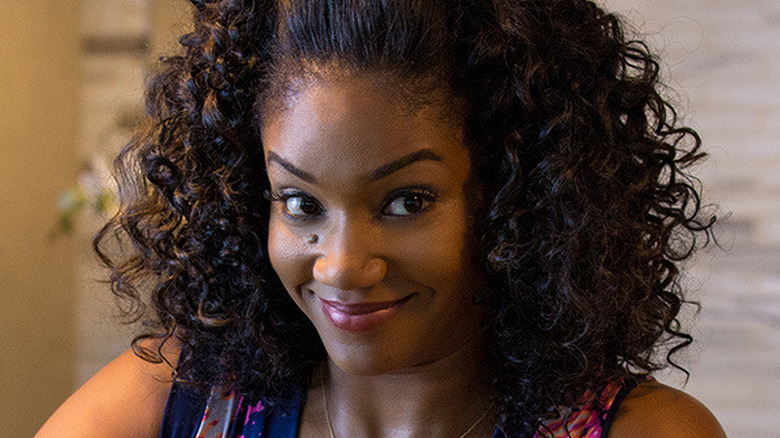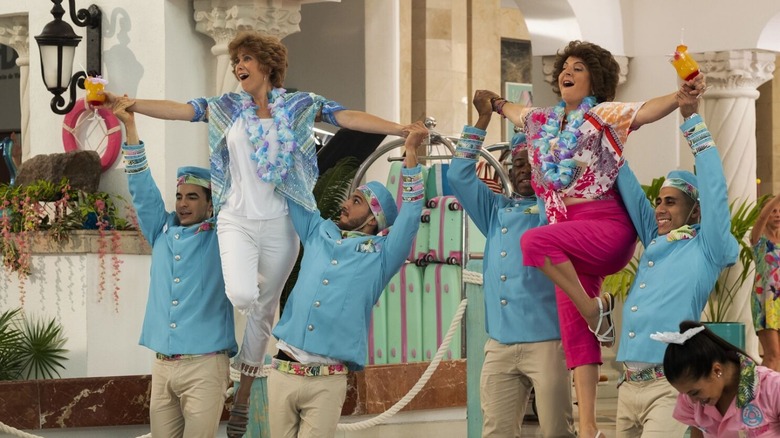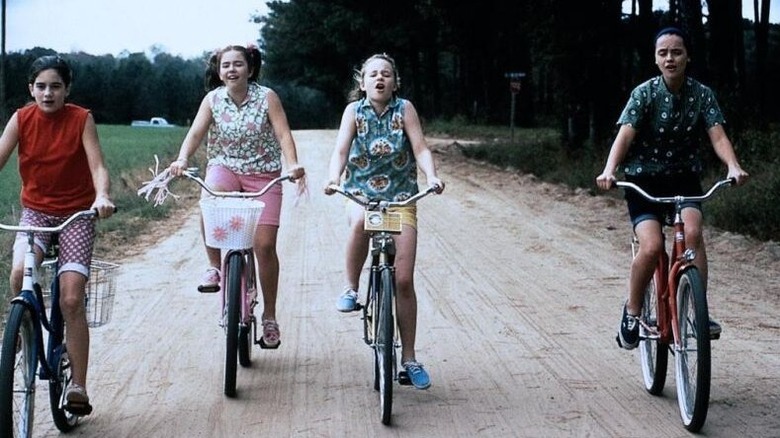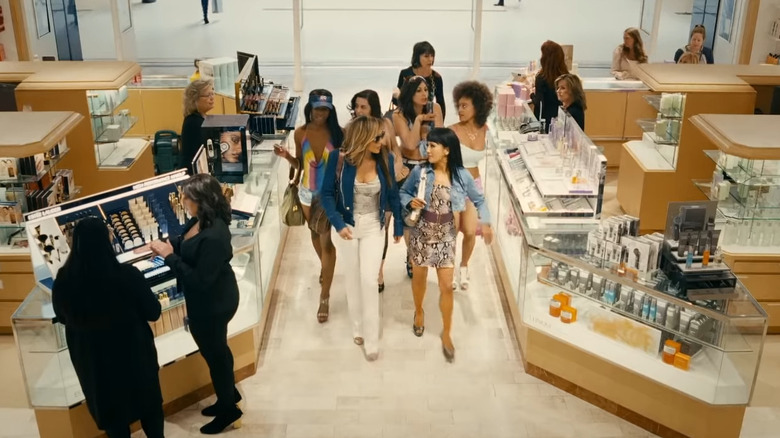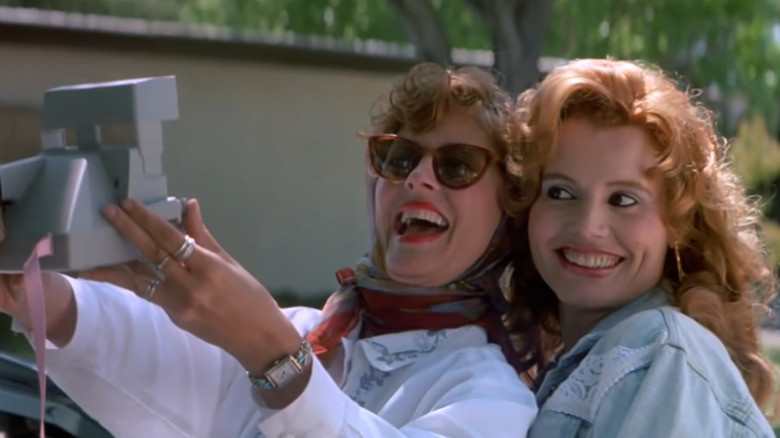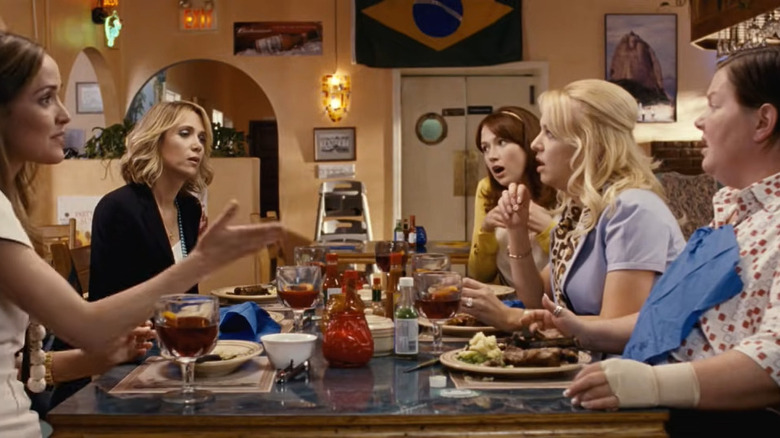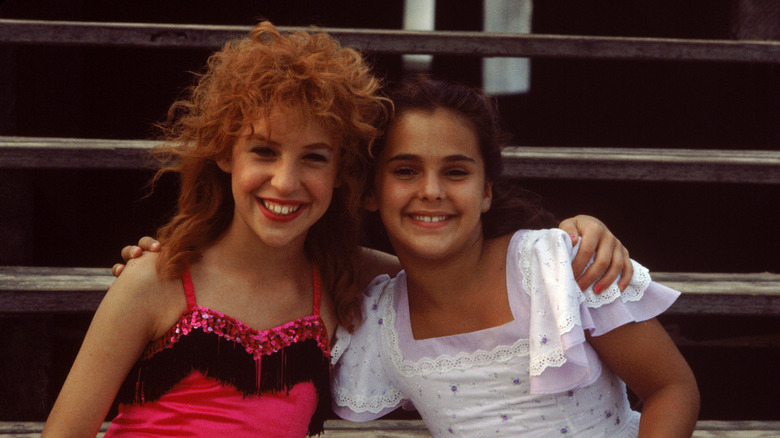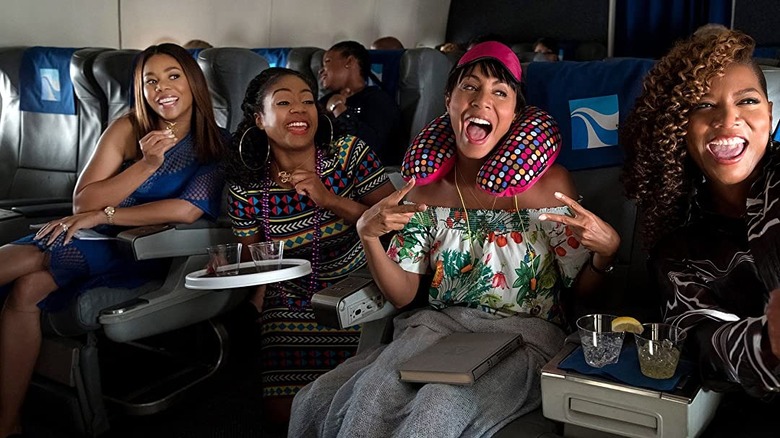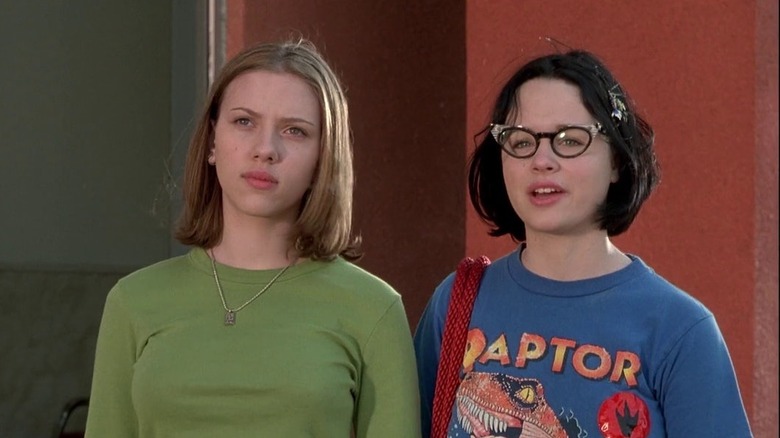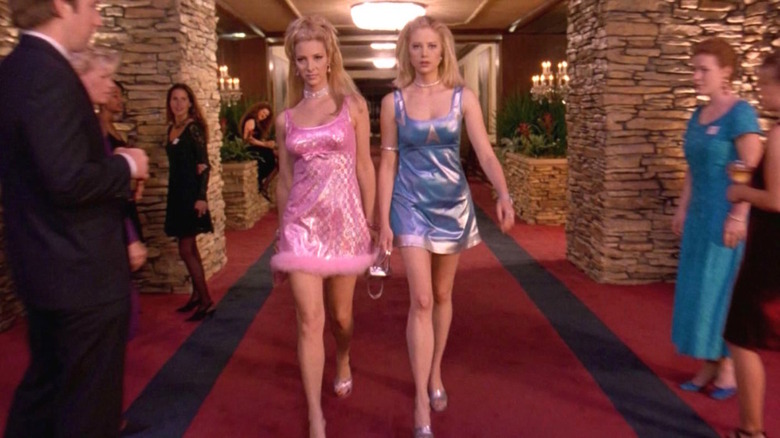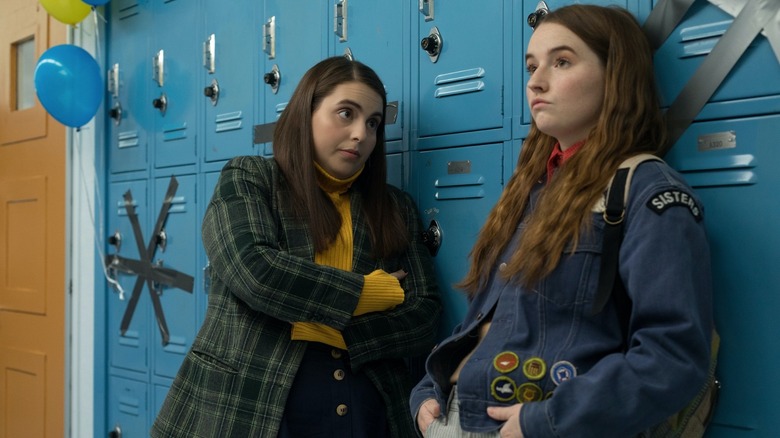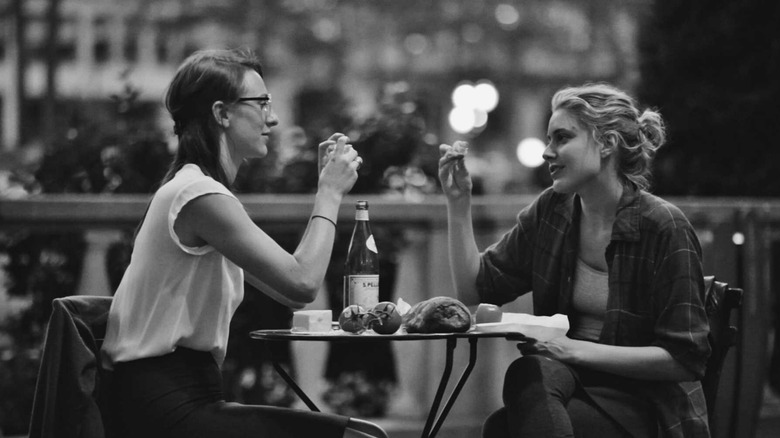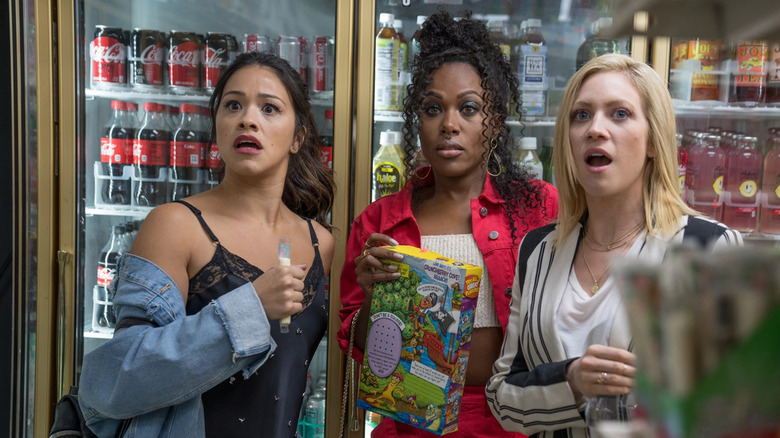12 Best Movies To Watch For Galentine's Day
To some extent, all movies are about friendship. Sure, romantic love and familial ties make for more straightforward plots, but the commitment and dedication to the friends we choose to have in our lives are always in the background. And for many films, those friendships are forged (or broken) in the foreground. 2022 releases like "RRR" and "The Banshees of Inisherin" are just two examples. The problem is — as it is in many genres — more of these movies have to do with male characters and male friendships, or even male and female friendships, than relationships that are exclusively between two or more women.
That's started to change in more recent years, though there are also great stories about best girl friends to be found as far back as the golden age of Hollywood, and many peppered throughout the 1980s and '90s. More recent films on the topic, from a broader range of genres, have also broadened the spectrum when it comes to age, race, class, body type, and sexual identity. If for any reason you're not in the mood for another will-they-won't-they romantic comedy or drama this Valentine's Day, you can celebrate Galentine's Day instead: A burgeoning holiday in its own right that's laid claim to February 13th. Pop some champagne and some popcorn for yourself and the special ladies in your life, and enjoy these great movies about the power of female friendship.
Barb and Star Go to Vista Del Mar
No movie is more rapturously and completely about the bond between female friends than 2021's "Barb and Star Go to Vista Del Mar." It's tempting to say that "Barb and Star" is quietly groundbreaking in its portrayal of two entirely un-selfconscious middle-aged pals trying to live their best lives. However, there's nothing quiet about this cuckoo bananas comedy. Annie Mumolo and Kristen Wiig play the titular BFFs who, after getting kicked out of their "talking club" back home in Nebraska, decide to take a treat-yourself trip to a resort in Florida.
Though Barb and Star are thick as thieves, a man does briefly come between them. Jamie Dornan shows up and gives an unhinged yet perfectly calibrated performance as a lovesick Bond villain's unwitting henchman. If that doesn't make sense, don't worry. Very little of "Barb and Star" makes sense, which is part of the appeal. Mumolo and Wiig (who also wrote the script) are so specific and strangely relatable in their depictions of these codependent, culotte-obsessed platonic life partners that even when killer mosquitos and mystical water spirits swim their way into the story, Barb and Star's love and support of each other stays at the center. "Barb and Star Go to Vista Del Mar" is one of the funniest comedies in recent memory, period, and it lifts its 40-or-50-something midwestern characters up when, too often, the Barbs and Stars of the world are held down.
Now and Then
"Boys on bikes" has been a genre unto itself at least since Steven Spielberg got behind a camera. Films like 1985's "Goonies," 1986's "Stand by Me," and 1993's "The Sandlot" delve into boyhood by making tweens the central characters and dramatizing the obstacles they face on their journey to independence. In 1995, "Now and Then" attempted to do the same thing for the much more fraught experience of being a girl. The film wasn't a four-quadrant hit the way something like "E.T." was, to say the least, but it's been reclaimed by its fans over the last 25-plus years, who hold it in high regard and consider it a sentimental favorite as well as an important milestone in coming-of-age cinema.
"Now and Then" takes place on two timelines, as these sorts of nostalgia pieces often do. In one, the main characters — Samantha, Roberta, Chrissy, and Teeny — are adults, played by Demi Moore, Rosie O'Donnell, Rita Wilson, and Melanie Griffith, respectively. In the other, they're precocious 12-year-olds played by Gabby Hoffman, Christina Ricci, Ashley Aston-Moore, and Thora Birch. In the past tense, the girls are consumed by phenomena like the onset of puberty, parents' divorce, and their crushes on boys. But when they stumble upon the headstone of a kid who died under suspicious circumstances, the friend group coalesces around a common goal — to uncover the truth about what happened to Dear Johnny. The mystery becomes a satisfying and meaningful metaphor for growing up and growing apart.
Hustlers
2019's "Hustlers" isn't just a great movie about female friendship; it's also one of the best movies about working-class economics and the 2008 recession. This criminally underrated dramedy is based on a New York Magazine article by Jessica Pressler, a fictionalized version of whom appears in the film (played by Julia Stiles) as a framing device. "Hustlers" follows a group of exotic dancers (Constance Wu, Keke Palmer, Cardi B, Lizzo, Lili Reinhart, and Jennifer Lopez) whose own financial prospects rise and fall with those of their wealthy Wall Street patrons. When they realize how powerful men have been exploiting the system at the little guy's expense, they conspire to do some exploitation of their own on those powerful men's wallets.
"Hustlers" gives its multitalented stars myriad moments to shine. They get to dance, they get to crack wise, they get dramatic and emotional scenes that have audiences reaching for the tissues, and they get to look fantastic while doing it all. Everyone's great, but Jennifer Lopez is the standout, with her range as a charismatic musical performer, deft comedian, and serious actress on display. She gives a career-best performance as Ramona Vega, the headliner at Moves (the strip club at which the film takes place) and the group's mother figure. "Hustlers" is a more ambitious and complex film than audiences may have realized from its trailer, tackling everything from the dignity of sex work to the cascading effects of poverty. But at its core, it's an unflinching portrait of the relationships that women form with each other in both the lean times and the days of plenty.
Thelma & Louise
1991's "Thelma & Louise" is such a tour de force, it defies easy classification or description. Directed by Ridley Scott from a script by Callie Khouri (who won the Oscar for best original screenplay), this buddy road movie left a lasting impression on popular culture, particularly for its oft-referenced final scene. Geena Davis and Susan Sarandon star as the titular characters. Thelma is unhappy in her marriage to a brutish salesman. Louise is a free-spirited waitress who dates transient rock stars and says whatever's on her mind. Both feeling the urge to escape their lives for a while, they rent a cabin for a weekend getaway. But before they ever arrive at their destination, they encounter a series of men who send them on various detours, some traumatic and some comedic.
"Thelma & Louise" doesn't shy away from the harsh realities that many female friends have to guide each other through. The film illustrates why it's hard to leave abusive relationships and why women hesitate to and often don't report sexual assault. It's not always an easy watch, but it's captivating nevertheless thanks to Davis and Sarandon's complex and lively performances. "Thelma & Louise" subverts the road movie — a traditionally male sub-genre — to make some bold statements about women's limited freedom in society and the degree to which they rely on each other for safety and validation.
Bridesmaids
2011's "Bridesmaids" was marketed with the phrase, "Chick flicks don't have to suck." Surely, that was an attempt to bring in an audience beyond "chicks." It worked. The comedy was a smash hit, making more than $300 million and earning Academy Award nominations for Kristen Wiig and Annie Mumolo (Best Writing, Original Screenplay) and Melissa McCarthy (Best Performance by an Actress in a Supporting Role).
Maya Rudolph plays Lillian, the bride-to-be who corrals her disparate group of besties, beginning with her engagement party. The impending wedding is, of course, part of the plot, but the focus mostly stays on the bridal party, led by Kristen Wiig as Lillian's ne'er-do-well maid of honor, Annie. McCarthy, Rose Byrne, Wendi McClendon-Covey, and Ellie Kemper round out the rest of the hilarious main cast.
"Bridesmaids" gives six great female comedians the chance to do the kind of gross-out humor and edgy observation that's usually reserved for men in movies like "The Hangover," a film to which it's often been compared. One infamous sequence involves the trying on of expensive gowns just as severe indigestion from spoiled meat sets in. The harder R-rated parts of "Bridesmaids" are funny, but where it upstages its competition — regardless of gender — is in its exploration of jealousy within adult friendship dynamics. It's incredibly re-watchable because it works on so many levels, from gags about puppies as party favors to figuring out mid-life crises with a little help from your friends.
Beaches
If you're of a certain age, 1988's "Beaches" was the kind of VHS tape that probably got worn out at sleepovers with the likes of "Dirty Dancing" and "Grease." Another period piece that takes place mostly in flashback, this tearjerker stars Barbara Hershey and Bette Midler as the adult versions of the main characters and a young Mayim Bialik and Marcie Leeds as the girls in their youth. C.C. Bloom (Bialik and Midler) is a plucky child performer with a domineering stage mom. Hillary Whitney (Leeds and Hershey) is the straight-laced daughter of more blue-blooded stock. These opposites quickly attract and begin a lifelong friendship, though that friendship is repeatedly tested and strained.
"Beaches" is decidedly melodramatic — a tone that's captured by its original song, "Wind Beneath My Wings." Men and jobs come and go, but C.C. and Hillary stay constants in each other's lives, even when (at various points throughout the film) they aren't very good friends or even very decent people. But that's intrinsic to why this movie is so unique. It's rare that we get to see female characters, warts and all, at every stage of life, sharing the spotlight. "Beaches" might start out with familiar, paper-thin archetypes, as critics mentioned in their mixed-to-poor reviews, and it's about as emotionally manipulative as those reviews accused it of being. But that's also part of why the film's fans love it so much.
Girls Trip
"Girls Trip" was a surprise hit with critics and audiences in 2017, grossing nearly $150 million at the global box office. But maybe it shouldn't have been a surprise. Movies starring ensembles of famous female leads have a track record of success (see "Bridesmaids"), and movies starring ensembles of famous Black female leads arguably have an even stronger track record (like "Waiting to Exhale," "Set It Off," and "Hidden Figures," all of which were strong candidates for this list), despite the fact that Black female writers, directors, and actors have historically been given fewer opportunities.
This destination vacation comedy made the cut because friendship (as opposed to men or money) is the itinerary. Yes, there are rom-com elements, and the four leads have to be defined somewhat by their careers and relationship status. But Ryan (Regina Hall), Sasha (Queen Latifah), Lisa (Jada Pinkett-Smith), and Dina (Tiffany Haddish) — who make up the "Flossy Posse" — head to the Essence Music Festival mostly to have a raucous good time with each other. "Girls Trip" doesn't break the bawdy buddy comedy mold, but it uses that mold to make a really entertaining movie for an underserved audience, and it gives its four leads great opportunities to do what they do best.
Ghost World
Like "Daria" in live-action, 2001's "Ghost World" is a female friendship movie for the kind of girls who collect old albums and wear combat boots. It's based on a comic of the same name by Daniel Clowes, who also co-wrote the screenplay. This indie dark comedy about two listless young women stars Scarlett Johansson in an early role and Thora Birch (making her second appearance on this list). Birch plays Enid, an uninspired but gifted artist caught in limbo trying to secure her high school diploma. Johansson is her best friend, Rebecca, who's slightly more socially accepted but still just as sarcastic and disaffected. On a lark, Enid and Rebecca catfish a middle-aged nerd named Seymour (Steve Buscemi), but their longstanding friendship begins to splinter when Enid feels sympathy for him and gets to know him better.
Rebecca starts to take small steps toward adulthood like getting and keeping a job and looking for an apartment, and Enid spends her time trying to find Seymour a girlfriend, while he in turn first helps and then hurts her blossoming art career. "Ghost World" isn't for everybody. It's squirmy, thorny, and bleak, and Enid's friendships with both Rebecca and Seymour are pretty dour. But its unfussy realism and emotional honesty earned it a perfect four stars from Roger Ebert, who said of the pitch-black satire, "I wanted to hug this movie."
Romy and Michele's High School Reunion
Before there was "Barb and Star Go to Vista Del Mar," there was 1997's "Romy and Michele's High School Reunion." While it's not as stuffed full of non-sequiturs, Wiig and Mumolo owe a great deal of their schtick to this off-the-wall best-friends comedy that preceded it by nearly 25 years. Lisa Kudrow (at the height of her "Friends" fame) and Mira Sorvino (fresh off of her Oscar for "Mighty Aphrodite") dared to star in this aggressively weird tale of two roommates that was way ahead of its time. Back then, it barely broke even at the box office, but it has since become a cult classic, and it ushered in a purposefully awkward and random comedic sensibility that's still en vogue today.
Romy (Sorvino) and Michele (Kudrow) were outcasts in high school who found each other and, in the intervening decade, haven't really grown up. With their 10-year reunion quickly approaching, they hatch a scheme to pose as successful career women (claiming to have invented the Post-it note), thereby impressing all the girls who were mean to them and the boys who ignored them. Of course, their plans go uproariously awry, culminating in a trance-like lyrical dance number to Cyndi Lauper's "True Colors" that also stars Alan Cumming. "Romy and Michele's High School Reunion" is ultimately a parable about not judging others and the virtues of bravely becoming and remaining one's authentic self, at any stage of life.
Booksmart
There are dozens of comedies about best friends facing the end of high school and the beginning of the rest of their lives. "Ferris Bueller's Day Off," "American Pie," and "Superbad" are all great, but they're also all from male perspectives. Women get more to do in some than in others (and are, regrettably, often treated like prizes to be won), but in 2019's "Booksmart," two graduating gal pals finally get to be the protagonists. Beanie Feldstein and Kaitlyn Dever co-star as Molly and Amy, two good-grade-getting goodie-two-shoes who need to cut loose after discovering, much to their horror, that they didn't have to stay so well-behaved, chaste, and sober to get into Yale. With only one night of high school left, they decide to go to their first-ever blowout party.
"Booksmart" is a one-crazy-night comedy that keeps disrupting Molly and Amy's modest plans. It trades in the usual tropes: Characters unintentionally getting high, sexual prospects abounding and misunderstandings driving a wedge between the two leads. But there was enough novel stuff about "Booksmart" at the time to impress critics and audiences. Molly and Amy are imbued with more dimension than most characters in teen comedies, let alone most teenage girls. The film also drew praise for the handling of its LGBTQ+ storyline and its ability to be as sharply and broadly funny as its male-centric counterparts without resorting to the genre's signature nastiness.
Frances Ha
Greta Gerwig has written and directed some of the best movies about women in recent memory. She's the mind behind 2017's "Lady Bird" and the 2019 adaptation of "Little Women," both of which were Oscar-nominated. Those are all-time great films about mothers, daughters, and sisters. "Frances Ha," the 2012 film she co-wrote with her creative and life partner, Noah Baumbach, has more to do with female friendship, and it happens to star Gerwig in the breakout leading role.
Much like the young women in "Ghost World," Frances is a young adult for whom not much has happened yet. She's trying to make it as a dancer in New York City, where she shares an apartment with her best friend from college, Sophie. And, as in "Ghost World," Frances and Sophie's once comfortable relationship becomes slowly (then suddenly) incompatible as their ambitions and other relationships pull them in opposite directions. From there, Frances — in the midst of her quarter-life crisis — interacts with other friends from both her current life and her past life back home in California.
"Frances Ha" is Gerwig's delicate black-and-white portrait of a flawed woman and a flawed friend. It's a bittersweet admission that we grow and change in different ways and at different times in which many viewers will see themselves.
Someone Great
This hidden gem on Netflix was produced by Paul Feig (of "Bridesmaids") and marks the promising directorial debut of Jennifer Kaytin Robinson, who also wrote the script. 2019's "Someone Great" has a fascinating origin. Robinson's story — about a music journalist whose boyfriend breaks up with her just as her career is taking off — came to her after she listened to the Taylor Swift song "Clean." The pop star later saw the film and was herself inspired to write another song, "Death by a Thousand Cuts," even though she didn't know she'd been the inspiration for "Someone Great" in the first place.
Connections to Swift aside, "Someone Great" is a solid if familiar rom-com and friend-com that prioritizes girl bonds and the pursuit of one's dreams over committed relationship statuses. The film stars Gina Rodriguez as Jenny and LaKeith Stanfield as her long-term-then-ex-boyfriend Nate. Brittany Snow and DeWanda Wise round out the cast as supportive friends with some romantic drama in their own personal lives. "Someone Great" is another one-crazy-night movie, though it doesn't get as crazy as most, to its credit, and its conclusion is more elegant than is typical for films of its ilk. Robinson's plotting and style of comedy don't demonize the men (or women) in Jenny and her friends' lives, even as it is about various romances ending and beginning. It's mostly about friendships enduring, even as people inevitably move from one stage of life to another.
